Holism and Reductionism: A Comparative Analysis in Biology
VerifiedAdded on 2021/10/01
|6
|1634
|248
Essay
AI Summary
This essay provides a comprehensive comparison of holism and reductionism, two fundamental concepts in biology and systems thinking. Holism, which emphasizes the idea that the whole is greater than the sum of its parts, is contrasted with reductionism, which focuses on breaking down complex systems into their constituent components for analysis. The essay explores the various definitions and applications of both approaches, including their advantages and disadvantages. It examines how holism considers a system as a whole, appreciating the interdependence of its components, while reductionism analyzes individual components to understand the overall system. The essay highlights the strengths and weaknesses of each approach, such as holism's ability to consider the entire system at once versus reductionism's scientific approach. Through this analysis, the paper aims to clarify the fundamental differences between holism and reductionism, providing a clear understanding of their impact in different areas of science and technology, with a particular focus on biology.
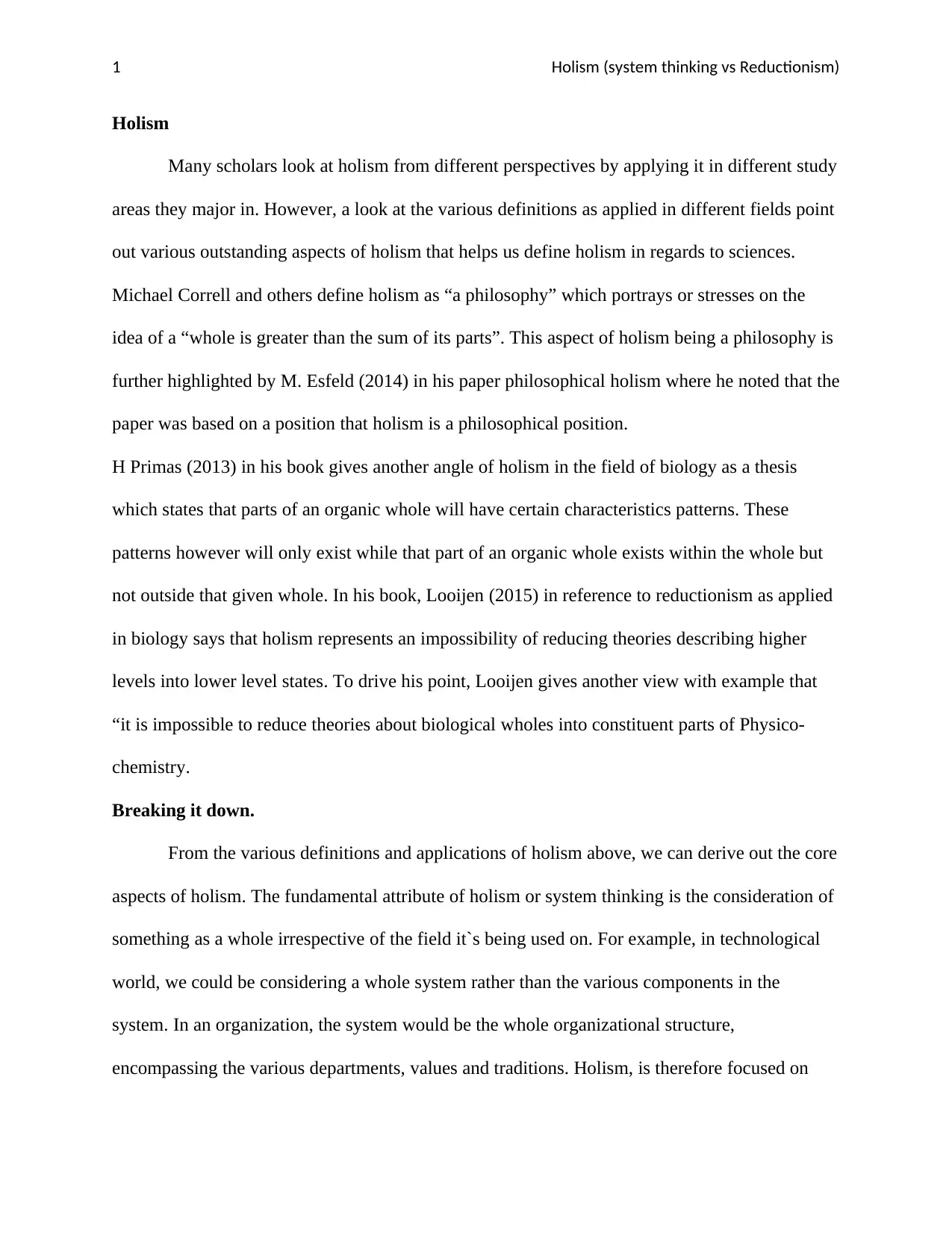
1 Holism (system thinking vs Reductionism)
Holism
Many scholars look at holism from different perspectives by applying it in different study
areas they major in. However, a look at the various definitions as applied in different fields point
out various outstanding aspects of holism that helps us define holism in regards to sciences.
Michael Correll and others define holism as “a philosophy” which portrays or stresses on the
idea of a “whole is greater than the sum of its parts”. This aspect of holism being a philosophy is
further highlighted by M. Esfeld (2014) in his paper philosophical holism where he noted that the
paper was based on a position that holism is a philosophical position.
H Primas (2013) in his book gives another angle of holism in the field of biology as a thesis
which states that parts of an organic whole will have certain characteristics patterns. These
patterns however will only exist while that part of an organic whole exists within the whole but
not outside that given whole. In his book, Looijen (2015) in reference to reductionism as applied
in biology says that holism represents an impossibility of reducing theories describing higher
levels into lower level states. To drive his point, Looijen gives another view with example that
“it is impossible to reduce theories about biological wholes into constituent parts of Physico-
chemistry.
Breaking it down.
From the various definitions and applications of holism above, we can derive out the core
aspects of holism. The fundamental attribute of holism or system thinking is the consideration of
something as a whole irrespective of the field it`s being used on. For example, in technological
world, we could be considering a whole system rather than the various components in the
system. In an organization, the system would be the whole organizational structure,
encompassing the various departments, values and traditions. Holism, is therefore focused on
Holism
Many scholars look at holism from different perspectives by applying it in different study
areas they major in. However, a look at the various definitions as applied in different fields point
out various outstanding aspects of holism that helps us define holism in regards to sciences.
Michael Correll and others define holism as “a philosophy” which portrays or stresses on the
idea of a “whole is greater than the sum of its parts”. This aspect of holism being a philosophy is
further highlighted by M. Esfeld (2014) in his paper philosophical holism where he noted that the
paper was based on a position that holism is a philosophical position.
H Primas (2013) in his book gives another angle of holism in the field of biology as a thesis
which states that parts of an organic whole will have certain characteristics patterns. These
patterns however will only exist while that part of an organic whole exists within the whole but
not outside that given whole. In his book, Looijen (2015) in reference to reductionism as applied
in biology says that holism represents an impossibility of reducing theories describing higher
levels into lower level states. To drive his point, Looijen gives another view with example that
“it is impossible to reduce theories about biological wholes into constituent parts of Physico-
chemistry.
Breaking it down.
From the various definitions and applications of holism above, we can derive out the core
aspects of holism. The fundamental attribute of holism or system thinking is the consideration of
something as a whole irrespective of the field it`s being used on. For example, in technological
world, we could be considering a whole system rather than the various components in the
system. In an organization, the system would be the whole organizational structure,
encompassing the various departments, values and traditions. Holism, is therefore focused on
Paraphrase This Document
Need a fresh take? Get an instant paraphrase of this document with our AI Paraphraser
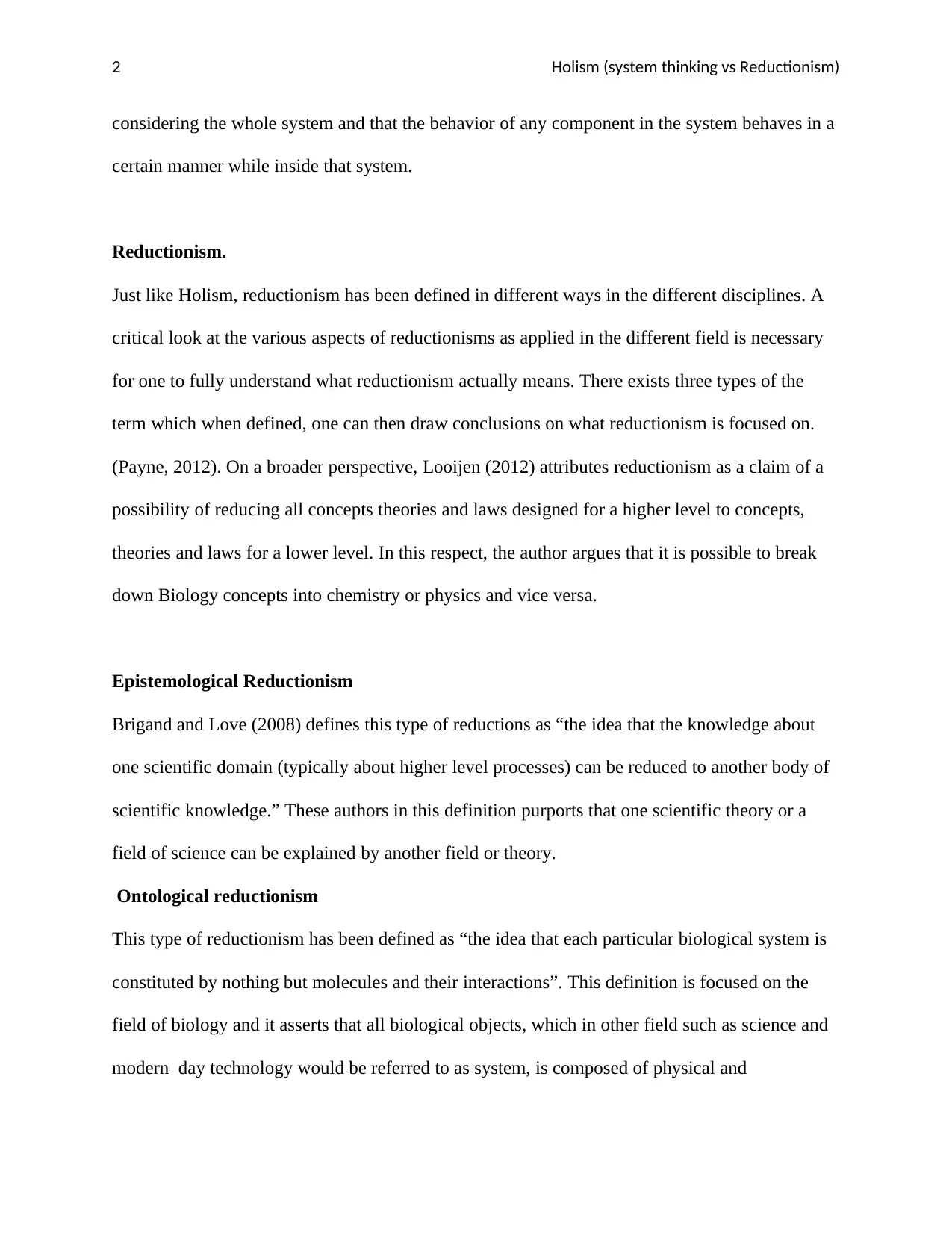
2 Holism (system thinking vs Reductionism)
considering the whole system and that the behavior of any component in the system behaves in a
certain manner while inside that system.
Reductionism.
Just like Holism, reductionism has been defined in different ways in the different disciplines. A
critical look at the various aspects of reductionisms as applied in the different field is necessary
for one to fully understand what reductionism actually means. There exists three types of the
term which when defined, one can then draw conclusions on what reductionism is focused on.
(Payne, 2012). On a broader perspective, Looijen (2012) attributes reductionism as a claim of a
possibility of reducing all concepts theories and laws designed for a higher level to concepts,
theories and laws for a lower level. In this respect, the author argues that it is possible to break
down Biology concepts into chemistry or physics and vice versa.
Epistemological Reductionism
Brigand and Love (2008) defines this type of reductions as “the idea that the knowledge about
one scientific domain (typically about higher level processes) can be reduced to another body of
scientific knowledge.” These authors in this definition purports that one scientific theory or a
field of science can be explained by another field or theory.
Ontological reductionism
This type of reductionism has been defined as “the idea that each particular biological system is
constituted by nothing but molecules and their interactions”. This definition is focused on the
field of biology and it asserts that all biological objects, which in other field such as science and
modern day technology would be referred to as system, is composed of physical and
considering the whole system and that the behavior of any component in the system behaves in a
certain manner while inside that system.
Reductionism.
Just like Holism, reductionism has been defined in different ways in the different disciplines. A
critical look at the various aspects of reductionisms as applied in the different field is necessary
for one to fully understand what reductionism actually means. There exists three types of the
term which when defined, one can then draw conclusions on what reductionism is focused on.
(Payne, 2012). On a broader perspective, Looijen (2012) attributes reductionism as a claim of a
possibility of reducing all concepts theories and laws designed for a higher level to concepts,
theories and laws for a lower level. In this respect, the author argues that it is possible to break
down Biology concepts into chemistry or physics and vice versa.
Epistemological Reductionism
Brigand and Love (2008) defines this type of reductions as “the idea that the knowledge about
one scientific domain (typically about higher level processes) can be reduced to another body of
scientific knowledge.” These authors in this definition purports that one scientific theory or a
field of science can be explained by another field or theory.
Ontological reductionism
This type of reductionism has been defined as “the idea that each particular biological system is
constituted by nothing but molecules and their interactions”. This definition is focused on the
field of biology and it asserts that all biological objects, which in other field such as science and
modern day technology would be referred to as system, is composed of physical and
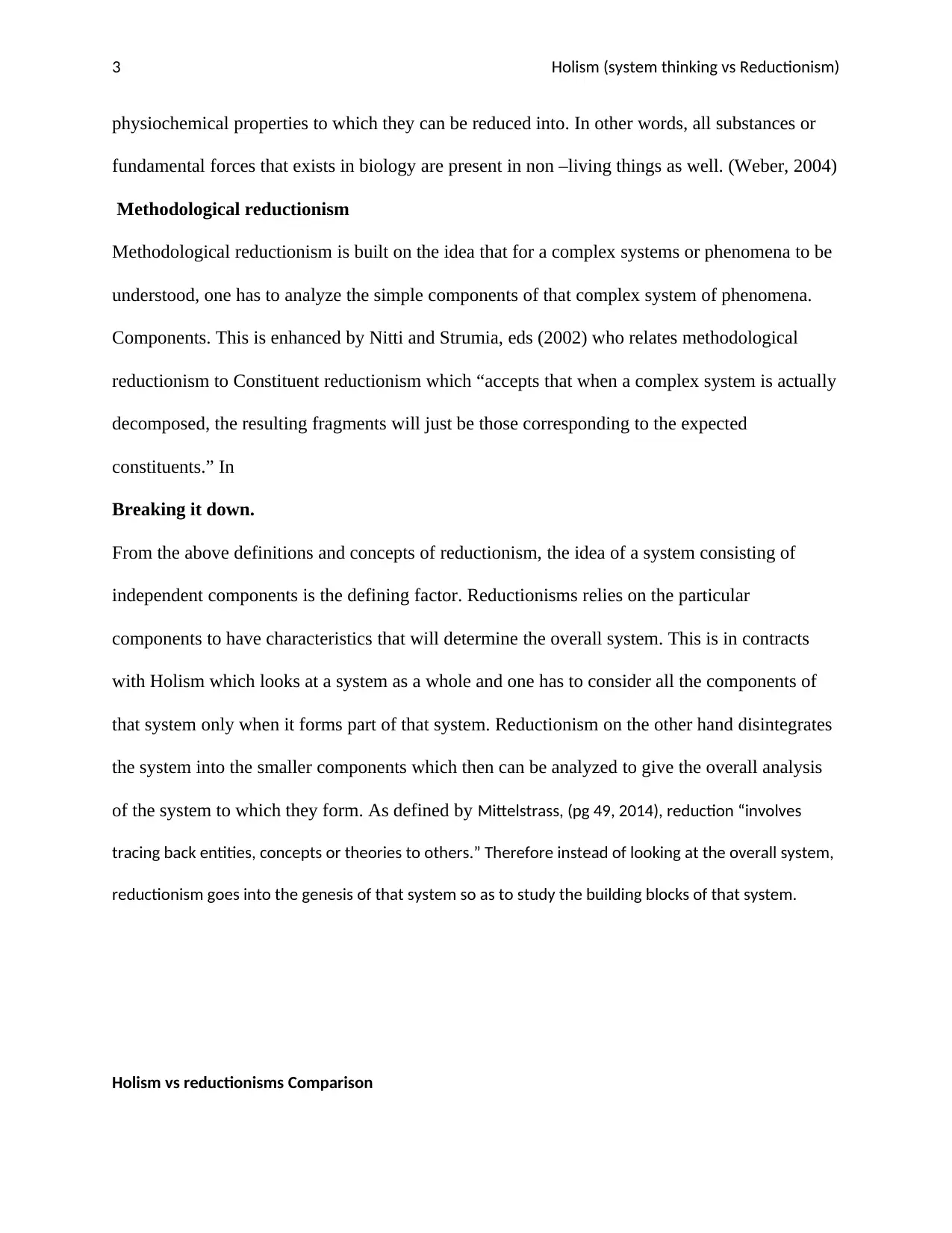
3 Holism (system thinking vs Reductionism)
physiochemical properties to which they can be reduced into. In other words, all substances or
fundamental forces that exists in biology are present in non –living things as well. (Weber, 2004)
Methodological reductionism
Methodological reductionism is built on the idea that for a complex systems or phenomena to be
understood, one has to analyze the simple components of that complex system of phenomena.
Components. This is enhanced by Nitti and Strumia, eds (2002) who relates methodological
reductionism to Constituent reductionism which “accepts that when a complex system is actually
decomposed, the resulting fragments will just be those corresponding to the expected
constituents.” In
Breaking it down.
From the above definitions and concepts of reductionism, the idea of a system consisting of
independent components is the defining factor. Reductionisms relies on the particular
components to have characteristics that will determine the overall system. This is in contracts
with Holism which looks at a system as a whole and one has to consider all the components of
that system only when it forms part of that system. Reductionism on the other hand disintegrates
the system into the smaller components which then can be analyzed to give the overall analysis
of the system to which they form. As defined by Mittelstrass, (pg 49, 2014), reduction “involves
tracing back entities, concepts or theories to others.” Therefore instead of looking at the overall system,
reductionism goes into the genesis of that system so as to study the building blocks of that system.
Holism vs reductionisms Comparison
physiochemical properties to which they can be reduced into. In other words, all substances or
fundamental forces that exists in biology are present in non –living things as well. (Weber, 2004)
Methodological reductionism
Methodological reductionism is built on the idea that for a complex systems or phenomena to be
understood, one has to analyze the simple components of that complex system of phenomena.
Components. This is enhanced by Nitti and Strumia, eds (2002) who relates methodological
reductionism to Constituent reductionism which “accepts that when a complex system is actually
decomposed, the resulting fragments will just be those corresponding to the expected
constituents.” In
Breaking it down.
From the above definitions and concepts of reductionism, the idea of a system consisting of
independent components is the defining factor. Reductionisms relies on the particular
components to have characteristics that will determine the overall system. This is in contracts
with Holism which looks at a system as a whole and one has to consider all the components of
that system only when it forms part of that system. Reductionism on the other hand disintegrates
the system into the smaller components which then can be analyzed to give the overall analysis
of the system to which they form. As defined by Mittelstrass, (pg 49, 2014), reduction “involves
tracing back entities, concepts or theories to others.” Therefore instead of looking at the overall system,
reductionism goes into the genesis of that system so as to study the building blocks of that system.
Holism vs reductionisms Comparison
⊘ This is a preview!⊘
Do you want full access?
Subscribe today to unlock all pages.

Trusted by 1+ million students worldwide
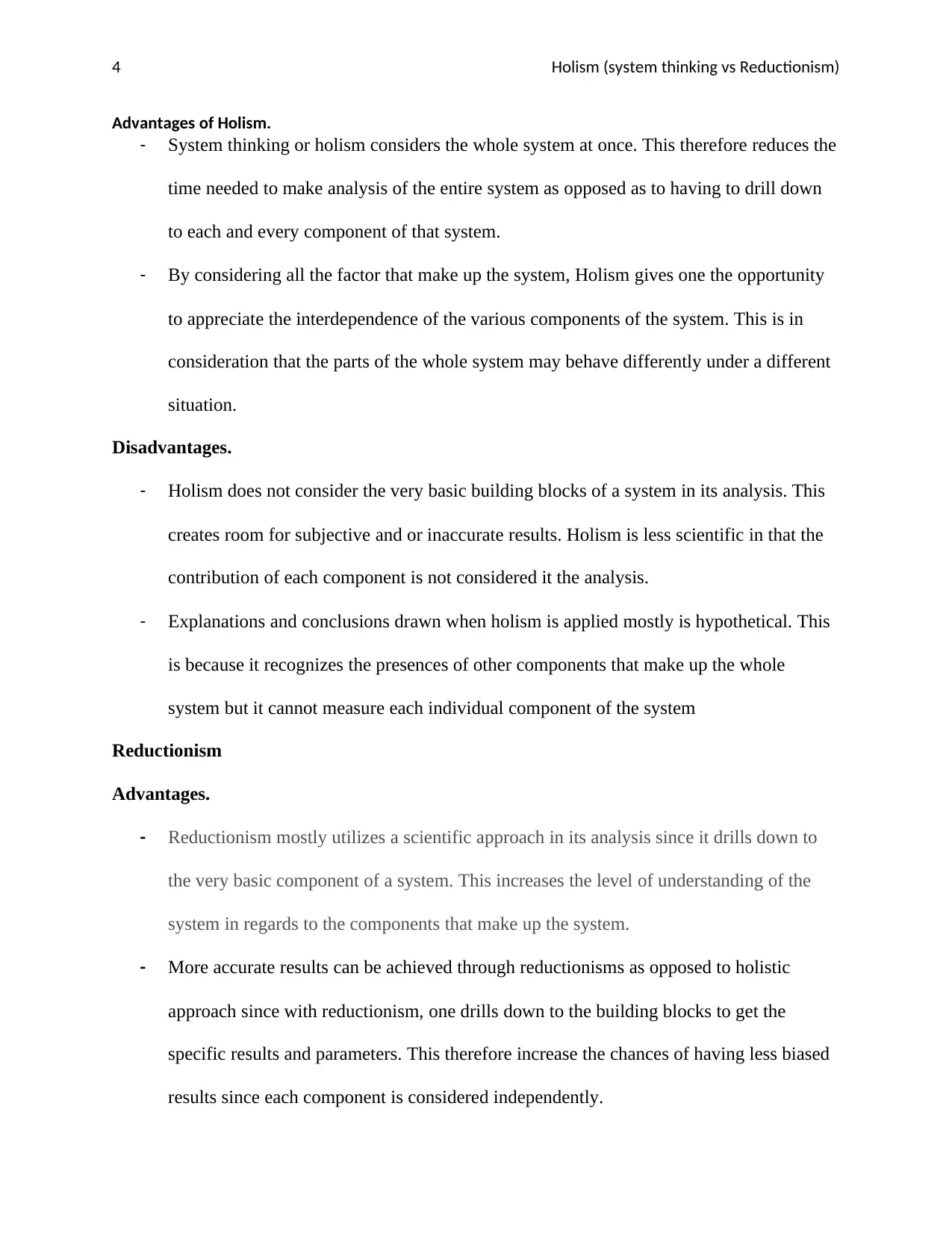
4 Holism (system thinking vs Reductionism)
Advantages of Holism.
- System thinking or holism considers the whole system at once. This therefore reduces the
time needed to make analysis of the entire system as opposed as to having to drill down
to each and every component of that system.
- By considering all the factor that make up the system, Holism gives one the opportunity
to appreciate the interdependence of the various components of the system. This is in
consideration that the parts of the whole system may behave differently under a different
situation.
Disadvantages.
- Holism does not consider the very basic building blocks of a system in its analysis. This
creates room for subjective and or inaccurate results. Holism is less scientific in that the
contribution of each component is not considered it the analysis.
- Explanations and conclusions drawn when holism is applied mostly is hypothetical. This
is because it recognizes the presences of other components that make up the whole
system but it cannot measure each individual component of the system
Reductionism
Advantages.
- Reductionism mostly utilizes a scientific approach in its analysis since it drills down to
the very basic component of a system. This increases the level of understanding of the
system in regards to the components that make up the system.
- More accurate results can be achieved through reductionisms as opposed to holistic
approach since with reductionism, one drills down to the building blocks to get the
specific results and parameters. This therefore increase the chances of having less biased
results since each component is considered independently.
Advantages of Holism.
- System thinking or holism considers the whole system at once. This therefore reduces the
time needed to make analysis of the entire system as opposed as to having to drill down
to each and every component of that system.
- By considering all the factor that make up the system, Holism gives one the opportunity
to appreciate the interdependence of the various components of the system. This is in
consideration that the parts of the whole system may behave differently under a different
situation.
Disadvantages.
- Holism does not consider the very basic building blocks of a system in its analysis. This
creates room for subjective and or inaccurate results. Holism is less scientific in that the
contribution of each component is not considered it the analysis.
- Explanations and conclusions drawn when holism is applied mostly is hypothetical. This
is because it recognizes the presences of other components that make up the whole
system but it cannot measure each individual component of the system
Reductionism
Advantages.
- Reductionism mostly utilizes a scientific approach in its analysis since it drills down to
the very basic component of a system. This increases the level of understanding of the
system in regards to the components that make up the system.
- More accurate results can be achieved through reductionisms as opposed to holistic
approach since with reductionism, one drills down to the building blocks to get the
specific results and parameters. This therefore increase the chances of having less biased
results since each component is considered independently.
Paraphrase This Document
Need a fresh take? Get an instant paraphrase of this document with our AI Paraphraser
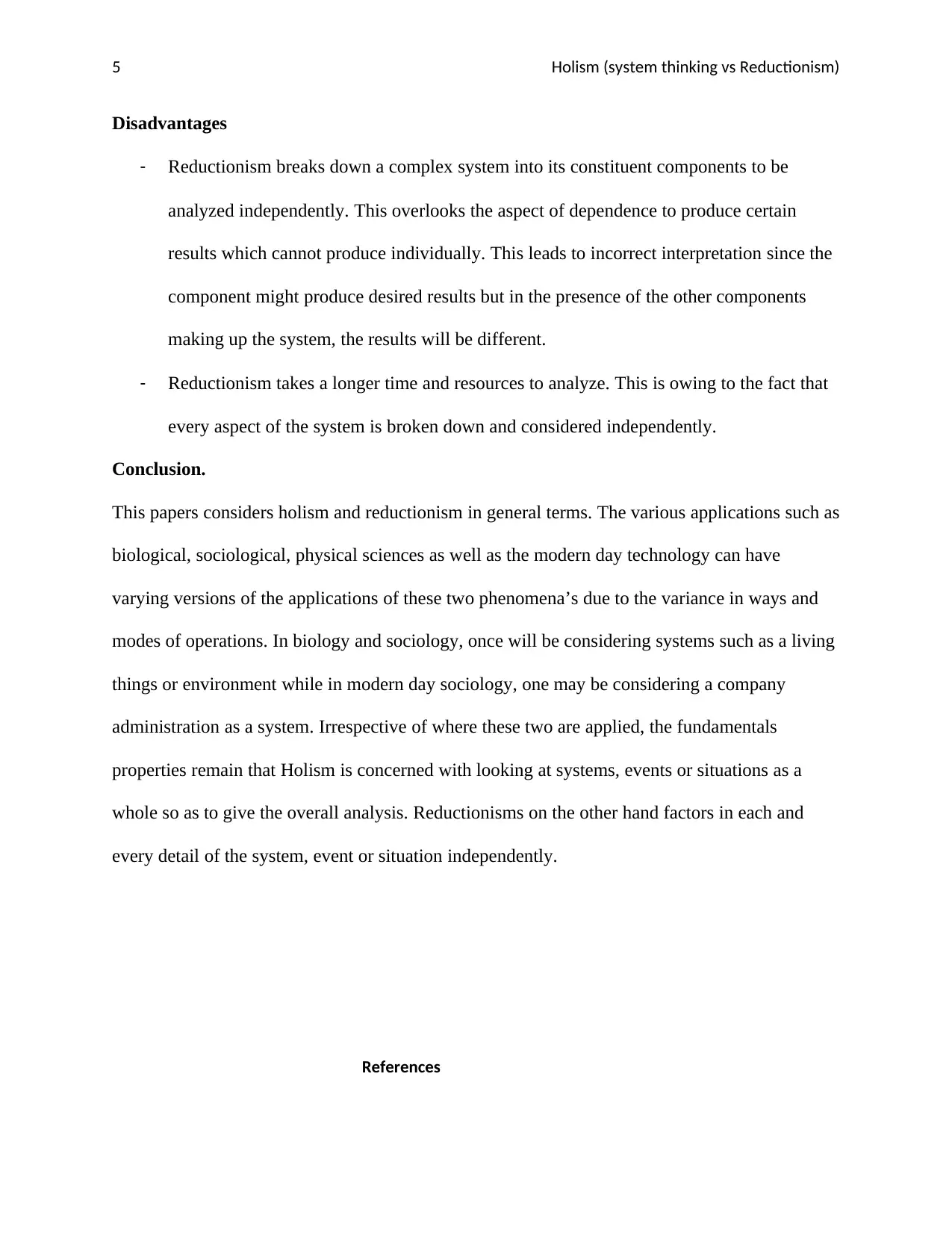
5 Holism (system thinking vs Reductionism)
Disadvantages
- Reductionism breaks down a complex system into its constituent components to be
analyzed independently. This overlooks the aspect of dependence to produce certain
results which cannot produce individually. This leads to incorrect interpretation since the
component might produce desired results but in the presence of the other components
making up the system, the results will be different.
- Reductionism takes a longer time and resources to analyze. This is owing to the fact that
every aspect of the system is broken down and considered independently.
Conclusion.
This papers considers holism and reductionism in general terms. The various applications such as
biological, sociological, physical sciences as well as the modern day technology can have
varying versions of the applications of these two phenomena’s due to the variance in ways and
modes of operations. In biology and sociology, once will be considering systems such as a living
things or environment while in modern day sociology, one may be considering a company
administration as a system. Irrespective of where these two are applied, the fundamentals
properties remain that Holism is concerned with looking at systems, events or situations as a
whole so as to give the overall analysis. Reductionisms on the other hand factors in each and
every detail of the system, event or situation independently.
References
Disadvantages
- Reductionism breaks down a complex system into its constituent components to be
analyzed independently. This overlooks the aspect of dependence to produce certain
results which cannot produce individually. This leads to incorrect interpretation since the
component might produce desired results but in the presence of the other components
making up the system, the results will be different.
- Reductionism takes a longer time and resources to analyze. This is owing to the fact that
every aspect of the system is broken down and considered independently.
Conclusion.
This papers considers holism and reductionism in general terms. The various applications such as
biological, sociological, physical sciences as well as the modern day technology can have
varying versions of the applications of these two phenomena’s due to the variance in ways and
modes of operations. In biology and sociology, once will be considering systems such as a living
things or environment while in modern day sociology, one may be considering a company
administration as a system. Irrespective of where these two are applied, the fundamentals
properties remain that Holism is concerned with looking at systems, events or situations as a
whole so as to give the overall analysis. Reductionisms on the other hand factors in each and
every detail of the system, event or situation independently.
References
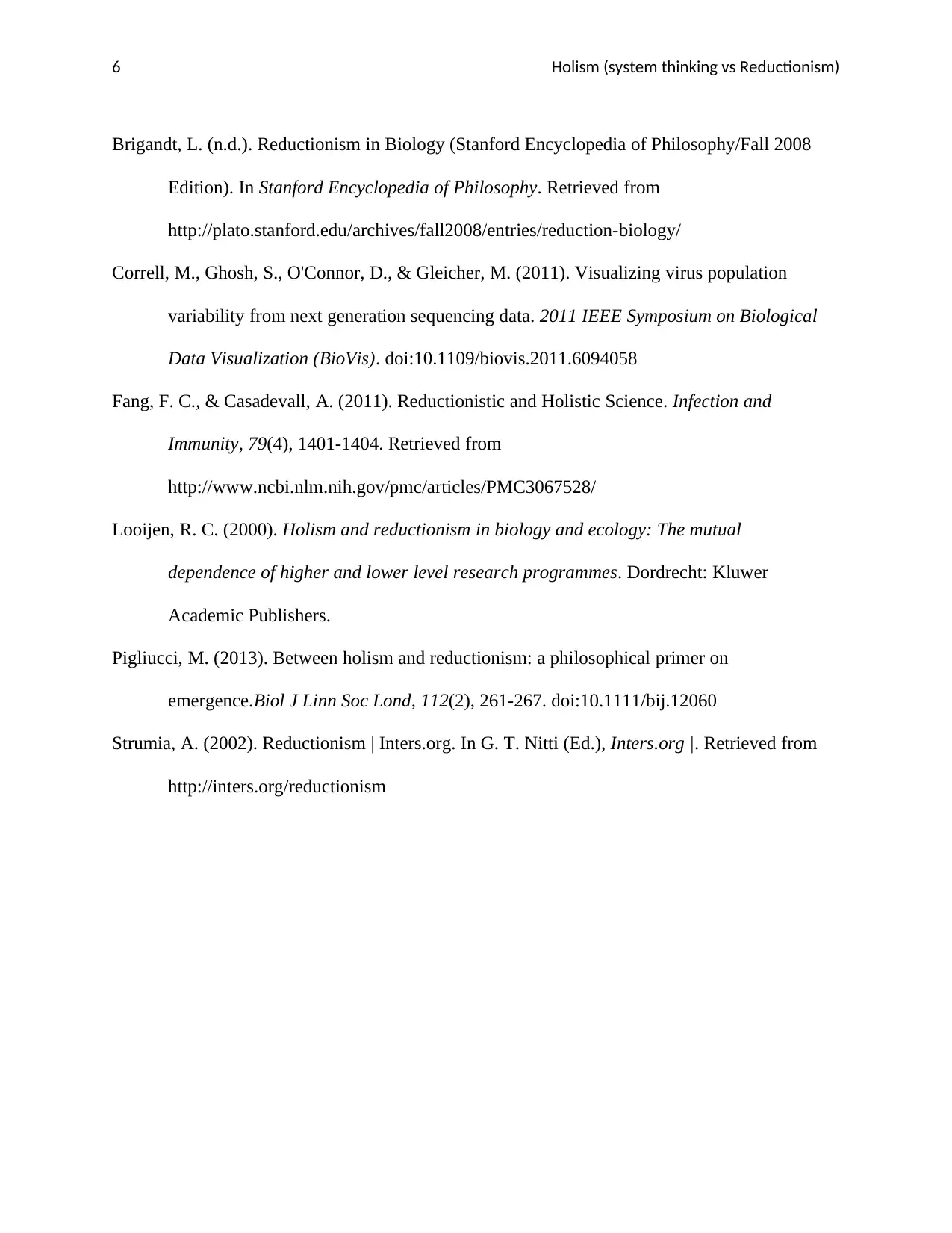
6 Holism (system thinking vs Reductionism)
Brigandt, L. (n.d.). Reductionism in Biology (Stanford Encyclopedia of Philosophy/Fall 2008
Edition). In Stanford Encyclopedia of Philosophy. Retrieved from
http://plato.stanford.edu/archives/fall2008/entries/reduction-biology/
Correll, M., Ghosh, S., O'Connor, D., & Gleicher, M. (2011). Visualizing virus population
variability from next generation sequencing data. 2011 IEEE Symposium on Biological
Data Visualization (BioVis). doi:10.1109/biovis.2011.6094058
Fang, F. C., & Casadevall, A. (2011). Reductionistic and Holistic Science. Infection and
Immunity, 79(4), 1401-1404. Retrieved from
http://www.ncbi.nlm.nih.gov/pmc/articles/PMC3067528/
Looijen, R. C. (2000). Holism and reductionism in biology and ecology: The mutual
dependence of higher and lower level research programmes. Dordrecht: Kluwer
Academic Publishers.
Pigliucci, M. (2013). Between holism and reductionism: a philosophical primer on
emergence.Biol J Linn Soc Lond, 112(2), 261-267. doi:10.1111/bij.12060
Strumia, A. (2002). Reductionism | Inters.org. In G. T. Nitti (Ed.), Inters.org |. Retrieved from
http://inters.org/reductionism
Brigandt, L. (n.d.). Reductionism in Biology (Stanford Encyclopedia of Philosophy/Fall 2008
Edition). In Stanford Encyclopedia of Philosophy. Retrieved from
http://plato.stanford.edu/archives/fall2008/entries/reduction-biology/
Correll, M., Ghosh, S., O'Connor, D., & Gleicher, M. (2011). Visualizing virus population
variability from next generation sequencing data. 2011 IEEE Symposium on Biological
Data Visualization (BioVis). doi:10.1109/biovis.2011.6094058
Fang, F. C., & Casadevall, A. (2011). Reductionistic and Holistic Science. Infection and
Immunity, 79(4), 1401-1404. Retrieved from
http://www.ncbi.nlm.nih.gov/pmc/articles/PMC3067528/
Looijen, R. C. (2000). Holism and reductionism in biology and ecology: The mutual
dependence of higher and lower level research programmes. Dordrecht: Kluwer
Academic Publishers.
Pigliucci, M. (2013). Between holism and reductionism: a philosophical primer on
emergence.Biol J Linn Soc Lond, 112(2), 261-267. doi:10.1111/bij.12060
Strumia, A. (2002). Reductionism | Inters.org. In G. T. Nitti (Ed.), Inters.org |. Retrieved from
http://inters.org/reductionism
⊘ This is a preview!⊘
Do you want full access?
Subscribe today to unlock all pages.

Trusted by 1+ million students worldwide
1 out of 6
Your All-in-One AI-Powered Toolkit for Academic Success.
+13062052269
info@desklib.com
Available 24*7 on WhatsApp / Email
![[object Object]](/_next/static/media/star-bottom.7253800d.svg)
Unlock your academic potential
Copyright © 2020–2025 A2Z Services. All Rights Reserved. Developed and managed by ZUCOL.


